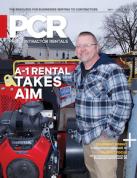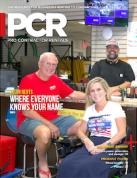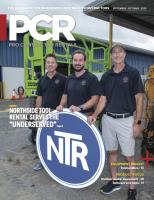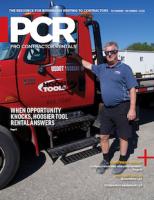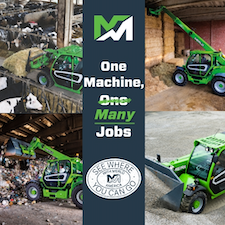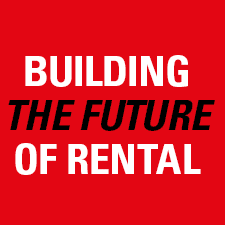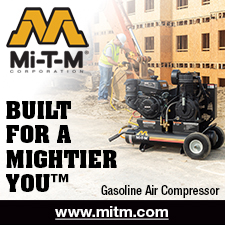Best practices for renting out equipment
Equipment Trader shares ideas for improving or increasing equipment rentals.
by Ethan Smith
With a growing equipment rental industry, and some great benefits for dealerships that offer equipment rentals, sales and marketing managers will have to develop and implement effective and appropriate strategies for connecting with renters and providing a high-quality rental experience.
An ethical and efficient rental operation will keep customers coming back, increase your chances for referrals, and maximize the earning potential of the rental side of your business. To help accomplish this feat, today Equipment Trader shares what it sees as its nine best practices for dealers renting out equipment.
Market those Rentals
As a dealer, you want to do everything you can to get your products in front of interested buyers. Developing a high-quality pool of potential renters is made easier when you use your advertising materials to clearly communicate the benefits of rentals for customers.
While the industry is growing, not every potential customer may understand that renting:
- is affordable,
- simple,
- provides flexibility during changing circumstances or emergencies,
- offers consistently up-to-date machinery,
- allows them to test drive equipment before choosing to buy, and
- provides opportunities to expand the reach of their own business with access to a wide selection of machinery for diverse jobs.
If customers understand that they stand to gain such impactful benefits, the rental side of your dealership will have customers lined up around the block, so communicate these advantages every chance you get.
Another great way to connect with interested renters is to make sure that you provide listings on your own website andalso place your inventory on leading third-party equipment rental markets like EquipmentTrader.com, which already has over 6,000 listings for rent from hundreds of dealers.
2. Understand the customer’s job.
What project do they want to complete? Which piece of equipment that you offer for rent could complete the task? Understanding the consumer’s job and being able to provide suggestions makes you a reliable source for equipment rentals, boosting your chances of earning repeat business and referrals.
3. Know the time.
Typically, equipment should be in use 60 to 70 percent of the time to be worth the purchase price. How often does the consumer plan to use a piece of equipment? If it’s more than 65 percent, you may want to direct them toward making a purchase. If it’s less, renting is likely the right choice.
Consumers will appreciate your expert guidance and your reputation for being a dealer with the customer’s best interest at heart will grow.
Plus, knowing the exact amount of time they need a machine can help determine the length of a rental, helping you draw up the appropriate contract.
4. Study the economy.
Renting during economic uncertainty can save consumers from expensive purchases of machines that could end up unused and collecting rust when the jobs dry up. By keeping tabs on economic performance indicators, you’ll know the best recommendations to make to consumers and the ideal times to successfully advertise for your equipment rentals.
5. Measure the competition.
What other equipment rental businesses are available to customers in your local market? What specific equipment rental inventory are those other dealerships offering? Do they advertise only on their own website, or are they also on leading third-party equipment rental markets such as EquipmentTrader.com?
Taking time to comprehensively track your competition and their available products lets you know how much of the market share you can expect to corner, what it will take to make your rental packages competitive, and how to best market your own dealership and the unique inventory and services you provide.
The importance of competitive market analysis is why Equipment Trader offers it as a dynamic reporting feature to every dealer listing equipment on our website.
6. Provide transparent quality.
As a dealer, your reputation is your most important commodity, which means trust and authenticity are paramount to your business model. There are a number of ways that you can use transparency to build your brand as a reputable dealership:
- Allow customers to inspect the machine.
Allow this examination to occur at every level, including mechanical, hydraulic, structural, in-cab, fluids, exhaust, and tire/track components. You provide high-quality machinery, so showing it off to the consumer can only boost your credibility as a leading equipment provider. - Offer to provide the history of the machine.
Involved contractors and other renters will often want to understand how the equipment has been used and cared for in the past. It’s likely you track equipment rental telematics, so offer the equipment’s use record, maintenance schedule and repair records, which prove you provide machinery that is well maintained. Finally, make sure the machine has been properly certified for use. Uncertified equipment is not only a turn-off for consumers, it may also be unsafe and even illegal. - Be transparent about yourself.
Knowing a rental dealer has a good reputation can give customers greater confidence in renting equipment from the dealership, and there are many ways consumers may research dealers. Allowing, and even encouraging, potential renters to ask around, look you up online, conduct a business background check, and confirm your ownership of the equipment shows that you have nothing to hide and that you’re a reliable business partner. - Be clear about the contract.
What is the full cost to rent? Does that include insurance for damages or theft, transportation fees or fuel surcharges? How long do renters get the machine? How do renters acquire and return the equipment? Are there late fees? Who is responsible for maintenance and repairs? What are the billing policies? Who is permitted to use the rented equipment? Being up-front and clear about contractual questions like these helps you fully communicate the costs and risks consumers incur when renting the machine, and hopefully prevents any misunderstandings or legal issues.
7. Look at long term.
Decide if you will offer any discounts for long-term rentals. After all, a long-term rental guarantees profitable business for your dealership for a prolonged amount of time. Long-term rentals can be good for renters too, since they ensure the equipment is available when needed while still avoiding the full cost of purchase and ownership. Advertising these benefits, along with a discount, could be a popular rental package and strong revenue source for your dealership.
8. Offer training.
As a dealer who would likely prefer to have rented-out equipment returned in the same condition it left, be sure renters know how to properly use a piece of machinery. Misusing equipment can be very unsafe and non-contractual use can make renters liable for damages, so they should appreciate any instruction you can provide about proper machine use.
If you really want to provide quality service for consumers, consider putting together safety training courses for the equipment you sell and rent. This is the type of service that can really make you an expert and leader in your local market.
9. Provide contact information.
If there is a problem with a rental machine, who should a renter contact? What are your hours of operation, and what is your response time? Is there a customer service or help-line to call? Do you want renters to call you directly?
Breakdowns and emergency situations can be stressful, so clearly-provided contact information for you and/or your dealership can help renters keep their work on track and can preserve their loyalty to your dealership despite any issues. Just knowing you’re looking out for them can go a long way with equipment renters and helps insulate your reputation from problems that are inevitable with any machine or business.
Of course, there are likely many more recommendations that could be made for equipment dealers wishing to start or grow a rental business. However, the overarching theme of these best practices should be clear: that the best dealers, the ones who craft a sterling reputation for quality service, are those who adopt a hands-on approach.
Getting to know and serve renters on a personal basis, and anticipating and addressing issues before they ever arise, may take up quite a bit of time. Yet your growing reputation as a trusted and respected leader in the equipment rental market — and the resulting boost in business and profits from that reputation — make all the effort worth it.
This article comes from Equipment Trader. Ethan Smith is a content curator for Equipment Trader, a division of Trader Interactive.




